- Home
- Isuna Hasekura
Side Colors III Page 2
Side Colors III Read online
Page 2
“S-seems like it’ll be cold tonight,” said Lawrence, scattering some conversational bait.
Holo said nothing.
This was serious.
Lawrence thought about the roasted pigskin. Anyone would be desperate, after making it all the way to a town only to be confronted with another cold night and a meal of bad bread and bad wine.
At the very least, the food situation could be remedied.
But honeyed peach preserves came at such a price. Would a single peach be ten trenni pieces? Or twenty?
It struck Lawrence as an absurd price, but it was true that he was capable of paying it. His coin purse could manage it, and there was Holo’s smile to consider.
Her silence was without her usual teasing and mischief.
In the end, Lawrence chose her.
“…I suppose it can’t be helped. Let’s visit the apothecary and see if we can’t find something to warm ourselves.”
Holo remained motionless. Motionless, yes, but her ears and tail quivered with a puppy’s glee.
The apothecary sold medicine, as one might expect, but also dealt in a variety of other goods.
In a town, the cobbler sold shoes and the tailor clothes, and generally the various guilds stayed in their own territories. Thus, the tailor could only also alter clothes, and a cobbler repair only shoes. A tallow seller could not sell bread, nor could a fishmonger sell meat.
By this logic, an apothecary ought to have only sold medicine, but it was common sense that offering a wider variety of goods brought in more customers, as any merchant knew perfectly well.
Thus, apothecaries would use all sorts of convoluted logic to pull in a great variety of goods. The products most likely to cause quarrels with other shops were none other than spices. Apothecaries would claim all sorts of spices were good for inducing sweat or lowering fevers, and thus qualified as medicine they could sell.
Extending that logic, anything good for one’s health also counted as medicine, and thus it was that apothecaries had become the chief dealers in honey.
The only other merchants who dealt in honey were the candlemakers, who sold beeswax candles.
It was difficult for traveling merchants—who dealt in anything and everything money could buy—to understand the turf wars between town merchants. But it was thanks to those turf wars that there was such an array of honeyed preserves lined up before them.
Plum, pear, raspberry, turnip, garlic, pork, beef, hare, mutton, carp, barracuda—these were just the ones that sprung to mind.
When preserving food, one could use salt, vinegar, ice—or honey. During this time of year, when the end of the long winter was yet far away, the prices of these preserves were at their highest. The contents of the bottles and barrels here, each labeled with a hasty scribble, would all fetch a good price.
Among all those lined-up goods, there was one that outshone all the rest. In the farthest corner of the shop behind the shopkeeper, enshrined on a shelf beside the pepper, saffron, and sugar, was an amber-colored bottle.
No sooner had they entered the shop than Holo’s gaze was fixed upon it.
“Welcome,” said the bearded shopkeeper, looking from Lawrence to Holo.
He noticed that Holo’s attention had been captured by something, so next he checked her manner of dress. One of his long eyebrows lifted minutely—the girl was well dressed, but not the man.
Whether or not he had concluded that even if they were here to shop, they would not be buying anything expensive, his tone was disinterested as he asked, “Are you looking for anything?”
“Something to warm us a bit. Ginger, perhaps, or…”
“Ginger’s on that shelf.”
The rest of Lawrence’s sentence was cut off in his throat, and there it vanished. If that’s all you’re here for, buy it and get out, the shopkeeper seemed to be saying. Lawrence did as he was told and looked over the ginger on the shelf, deciding on a honey-preserved variety. It was cheap but good for eating while huddled under blankets with nothing else to do.
But then he noticed Holo’s gaze on him—as though asking him, We’ve come to this place after all that talk, and after raising my expectations like this, you can’t just give up.
And of course, Lawrence had no intention of doing so.
It was too easy to buy Holo’s favor with food, and Holo herself found it tiresome on occasion. But when it came to honeyed peach preserves, things were different.
They had come up in conversation several times before, but as yet Lawrence had been unable to buy any. There was the matter of the high cost, of course, but more often than not they had simply been unavailable.
So perhaps that was why Holo’s enchantment with the food now wafted off of her in waves.
Lawrence walked past the vibrating Holo to the shopkeeper to have him portion out some of the ginger preserves and pay. He was obviously going to start bargaining, but—
“That’ll be ten ryut.”
Lawrence paid and wordlessly took the goods. Behind him he could feel Holo staring, stunned.
His eyes fixed upon the figure written on the label of the amber-colored bottle. One fruit for one lumione, or around thirty-five silver trenni.
For a moment he thought his eyes were mistaken, but no—that was indeed what was written there. The term peaches of gold was bandied about often enough, but even so—such a price!
After taking a goodly while to note what Lawrence was looking at, the shopkeeper spoke with a deliberately casual tone. “Ah, you’ve a good eye for quality. This year’s peaches were very sweet and firm as well. The honey is the finest from Baron Ludinhild’s forest. One lumione per fruit, and I’ve had many customers! Only three left, in fact. How about it?”
It was written on the man’s face that he knew Lawrence could not purchase such a thing. In a town like this, without connections to large trading companies or urban nobility, it was outrageous to put such a price on honeyed peach preserves. That he was treating his customers with such open contempt was proof of how confident he felt in his position.
But Lawrence had the confidence that came from having completed many trades in large towns. His hand moved toward his coin purse out of irritation at being treated like some novice peddler.
It was not a sudden prideful desire to conserve money that stopped him. Rather, it was a keen understanding of exactly how many coins were within that purse, keener than any god’s.
If he spent an entire lumione here, their travels might come to a premature end farther along the road. No merchant would be fool enough to keep their entire wealth on their person, so Lawrence was not carrying much on him at the moment.
Reality blocked the path to Holo’s smile. Realizing this, Lawrence shook his head. “Ha-ha. Too much for me.”
“Is that so? Well, come again if you change your mind.”
Lawrence turned around and left the shop, and Holo followed obediently behind him. She did not raise a single word of reproach, which was somehow worse.
He felt as though he were being stalked by a wolf in a dark forest, its footsteps matching his.
He had let her get her hopes up, and then in the end, he had not bought the item of her desire, which was much worse than simply pretending not to notice from the driver’s seat.
If he apologized first, it might lessen the wound, he thought; so steeling himself, he turned to her.
“…”
He was at a loss for words, but not because Holo’s face was a mask of rage. Rather, it was quite the opposite.
“Mm? Whatever is the matter?” she asked. Her words had no particular force to them, nor was there fire in her eyes.
If her color had been poor, he would have suspected her of being ill.
“N-nothing…”
“I see. Well, hurry up and get on, then. Your seat’s the farther one, is it not?”
“Er, yes…”
Lawrence did as he was told and climbed onto the wagon, as Holo followed closely behind him. He sat on the
far side, and she settled herself down neatly next to him.
If she seemed many times larger when she was angry, then her dejection had the opposite effect. Her desire to eat the honeyed peach preserves was a terrible thing surely.
This was not the sort of case where Lawrence could laugh off her gluttony. Here in the cold, hard air, they had been surviving on nothing but stale bread and sour wine for some time. There were countless stories of a bowl of soup presented to a lost king and his troop, only to have that rewarded with a great treasure, and now he could see why.
There was no question that Holo had been deeply, sincerely looking forward to the honeyed peach preserves. And now she looked absently ahead, not even speaking a single word of frustration to him.
This had to be because she knew both the great cost of the preserves and the current state of Lawrence’s coin purse.
Lawrence glanced over at her. Her body swayed with the jolts of the wagon. She seemed so absent that she might not have noticed if Lawrence were to suddenly embrace her.
The wagon trundled on.
They would probably be forced to make camp tonight. The only thing that made the hard wagon bed tolerable was knowing that a soft pillow and piles of blankets awaited their arrival in the next town.
“…”
Lawrence tugged on his beard with such force that it almost hurt, then closed his eyes. Perhaps he ought to turn around and slam the entire contents of his coin purse onto the apothecary’s counter.
And yet even as he reconsidered it, Lawrence’s hands did not pull the reins.
A whole lumione for a single peach was simply too much.
In addition to how difficult it would make continuing in their travels if he were to spend his money thus, there was the simple fact that Lawrence believed in the exchange of goods and money for a fair price.
Sweat broke out on his brow as he agonized over the impossible decision. Next to him, Holo, her shoulders slumped, hardly seemed like she could manage yet another night in the cold. The only thing that would return a smile and some good cheer to her would be the moment she could eat the coveted preserves.
He had to buy some.
Lawrence made up his mind and pulled up on the reins.
Holo noticed this and looked up at him, questioning.
One fruit for one lumione.
It was expensive, but what was that compared to Holo?
What’s more, the shopkeeper said he had three fruits left. If Lawrence did not hurry, it was likely he would sell them all. Business was so good in this town that eccentric young trade masters were putting them on loaves of bread and baking them, after all. It was not at all impossible that the apothecary would sell out.
The horse neighed and stopped, and just as Lawrence made to wheel around and head back into the crowd, he realized—
“Business is…good.”
Here in this town where the market was lively, travelers were many, and everyone’s business was booming. The town’s wealth had to be proportionate to that.
If so, Lawrence mused as he stroked his beard, the ideas in his head clicking pleasantly into place.
When the notion was complete, Lawrence took the reins up yet again and headed the wagon back in its original direction.
A man—a traveler, by the look of him—shouted in anger at Lawrence’s driving, but Lawrence merely begged it off with his mask of a merchant’s smile.
At this sudden change, Holo peered at him dubiously.
Lawrence gave a short answer. “Let’s drop by that trading company.”
“…Mm. Huh?” Holo began to make a sound of assent, but it changed into a questioning tone as it left her mouth.
But Lawrence did not reply, simply continuing to drive the wagon in the same direction.
He needed money to buy the honeyed peach preserves, and if he did not have it, he merely needed to earn it.
His destination was a trading company. Specifically, the company the two bakers were discussing: the Ohm Company.
Without money, goods could not be sold, which meant that where goods were selling, money had to be flowing.
The company to which this simple notion had brought Lawrence was the sort you might find anywhere, its modest size perfectly in proportion to the size of the town. Yet it was immediately evident that for some reason, this particular organization was burdened with an excess of money.
The sky was reddening with the setting sun, and though it was the hour when craftsmen would soon be heading home, there was a great clamor of people in front of this shop.
Men ran about this way and that, their eyes darting about with exhaustion and excitement. Some—merchants, probably—held ledgers as they shouted in hoarse voices.
What they seemed to be dealing in was not wheat nor grain nor fish, nor even furs or jewels.
It was wood. And iron.
Those were the raw materials out of which parts of some kind had been constructed, along with the tools for making them.
Literal mountains of such goods were piled on the company’s loading docks.
“.…What is this?” murmured Holo.
They had seen many busy companies, but nothing like the strange energy that pervaded here. While other trading houses would soon be closing for the day, here it seemed as though the main event was just about to start.
“It seems to be materials for building some sort of…something. A crow’s nest? No, this is…”
Lawrence did not know what the strange assemblage of parts was for. But farther in, he saw heaps of specialized goods, and something occurred to him.
No wonder this company was doing such good business. He smiled involuntarily at the thought.
Trading companies made money by buying goods, then selling them, so their biggest opportunities for profit came when they could position themselves as a supplier for a large project of some kind. They would place orders with craftsmen, collect components, and move them along, converting them into their profit margin without letting them lie idle a single night.
Lawrence could certainly understand why this young master fellow would have hit upon the notion of baking bread topped with honeyed peach preserves. He must have felt as though he had discovered a fountain of gold.
He noticed Holo return to her senses and look dubiously around her, as though understanding why this trading company was so busy but unsure why she and Lawrence were here.
“Well, then,” Lawrence murmured to himself. He climbed down from the wagon and strode calmly into the trading company.
It was so busy that nobody took notice of a single outsider like Lawrence walking in. Lawrence, for his part, had essentially memorized how to act natural in such situations.
Once he spied the man who seemed to be in charge, he spoke slowly and distinctly. “Hello, there. I’ve heard you’re shorthanded, so I’ve brought my vehicle.”
The merchant seemed not to have slept properly in days, and his eyes swiveled to glare at Lawrence.
In his hands were a quill pen and a tattered ledger, and his right eye drooped. Lawrence continued to smile as he waited for the man’s answer.
Time seemed to have frozen, but the merchant finally returned to himself and spoke. “Ah, uh, yes. We’ve been waiting. Just take the goods straightaway. Which wagon’s yours?”
His voice was hoarse and difficult to hear, and instead of an answer, Lawrence pointed to the item in question.
“What, that?” said the merchant rather rudely, but Lawrence was not flustered.
“I was thinking it would be best to load it as heavily as possible,” said Lawrence deliberately.
“Mmm, it’ll be slow, though…who recommended you to us? Why, I ought to…ah, well. Fine, load up what you can and leave. Quick about it, now.”
Business paralyzed all sensibilities.
Lawrence was fully aware that in situations like these, those in charge of details like who was doing what job or who was assisting whom could not even try to keep track of them. So, brazenly,
he followed up with another question.
“Er, the work came up so suddenly I didn’t catch the details. Who shall I take payment from? And what’s the destination?”
The man was mid-yawn, and made a face like a frog who’d had an insect fly right into his mouth and swallowed it right on the spot.
He had probably been about to hurl some abuse or at least some words of shock, but was too exhausted to turn down help, whatever form it took. He pointed to a man in the far corner who was battling some parchment on a desk. “Ask that fellow over there,” he spat.
Lawrence looked in the direction indicated. He scratched his head, every bit the dullard merchant. “Yes, sir, right away, sir,” he said.
The man seemed to forget about Lawrence that very same instant and set about giving orders to the men working on the loading dock.
Meanwhile, Lawrence ambled over to the man at the desk to receive his work orders.
There is an old story in the northlands that goes like this.
The men of a certain village could see to the far edge of the land, and if a bird took wing beyond the clouds, they could still shoot it down with their bows. Likewise, the women of this village could smile happily no matter how cold the winter grew, and even while they slept, their hands continued to spin yarn.
One day, a mysterious traveler came to this village, and as thanks for the night he stayed there, he taught the villagers how to read and write. Up until that point, they knew nothing of writing and had relied on oral traditions to remember their history and important events. For this reason, whenever anybody died from an accident or illness, the loss was felt very keenly.
They were very thankful to the traveler.
Then, once the traveler had departed on his journey, they realized something.
The men could no longer see to the ends of the sky, and the women began to shirk their work, no longer able to do it without tiring. Only the children, who had not learned to read or write, were unaffected.
It was this story that came to Lawrence’s mind as he regarded the pathetic young man who toiled drowsily away at the desk, constantly fighting off sleep as he frantically wrote.

 Wolf & Parchment, Volume 2
Wolf & Parchment, Volume 2 Wolf & Parchment, Volume 3
Wolf & Parchment, Volume 3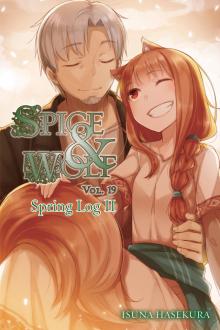 Spring Log II
Spring Log II Spring Log IV
Spring Log IV Wolf & Parchment: New Theory Spice & Wolf, Vol. 4
Wolf & Parchment: New Theory Spice & Wolf, Vol. 4 Spring Log III
Spring Log III Spice & Wolf IV
Spice & Wolf IV Spice & Wolf X (DWT)
Spice & Wolf X (DWT) Spice and Wolf Vol. 2
Spice and Wolf Vol. 2 Spice & Wolf XIII (DWT)
Spice & Wolf XIII (DWT) Spice and Wolf, Vol. 10
Spice and Wolf, Vol. 10 Spice & Wolf XVI (DWT)
Spice & Wolf XVI (DWT) Town of Strife I
Town of Strife I Spice and Wolf, Vol. 5
Spice and Wolf, Vol. 5 Side Colors II
Side Colors II Wolf & Parchment, Volume 1
Wolf & Parchment, Volume 1 Spice & Wolf Omnibus
Spice & Wolf Omnibus Spice & Wolf XII (DWT)
Spice & Wolf XII (DWT)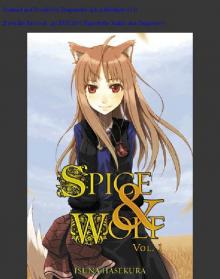 spice & wolf v3
spice & wolf v3 Spice & Wolf
Spice & Wolf Spice & Wolf VIII (DWT)
Spice & Wolf VIII (DWT) Spice and Wolf, Vol. 4
Spice and Wolf, Vol. 4 Spice & Wolf XIV (DWT)
Spice & Wolf XIV (DWT) Spring Log
Spring Log Spice & Wolf III
Spice & Wolf III Spice & Wolf VII - Side Colors
Spice & Wolf VII - Side Colors Spice & Wolf XV (DWT)
Spice & Wolf XV (DWT) Side Colors
Side Colors Side Colors III
Side Colors III Spice & Wolf VI
Spice & Wolf VI Spice & Wolf IX (DWT)
Spice & Wolf IX (DWT) Spice & Wolf V
Spice & Wolf V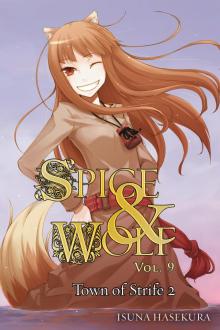 Town of Strife II
Town of Strife II Spice & Wolf XI (DWT)
Spice & Wolf XI (DWT) Spice and Wolf, Vol. 12
Spice and Wolf, Vol. 12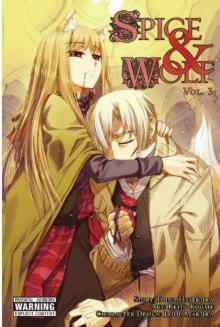 Spice and Wolf, Vol. 3
Spice and Wolf, Vol. 3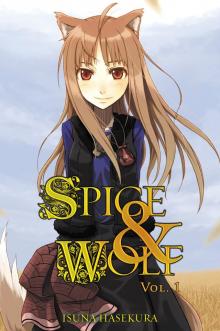 Spice and Wolf, Vol. 1
Spice and Wolf, Vol. 1 Spice & Wolf XVII (DWT)
Spice & Wolf XVII (DWT) Spice and Wolf, Vol. 6
Spice and Wolf, Vol. 6 Spice & Wolf II
Spice & Wolf II